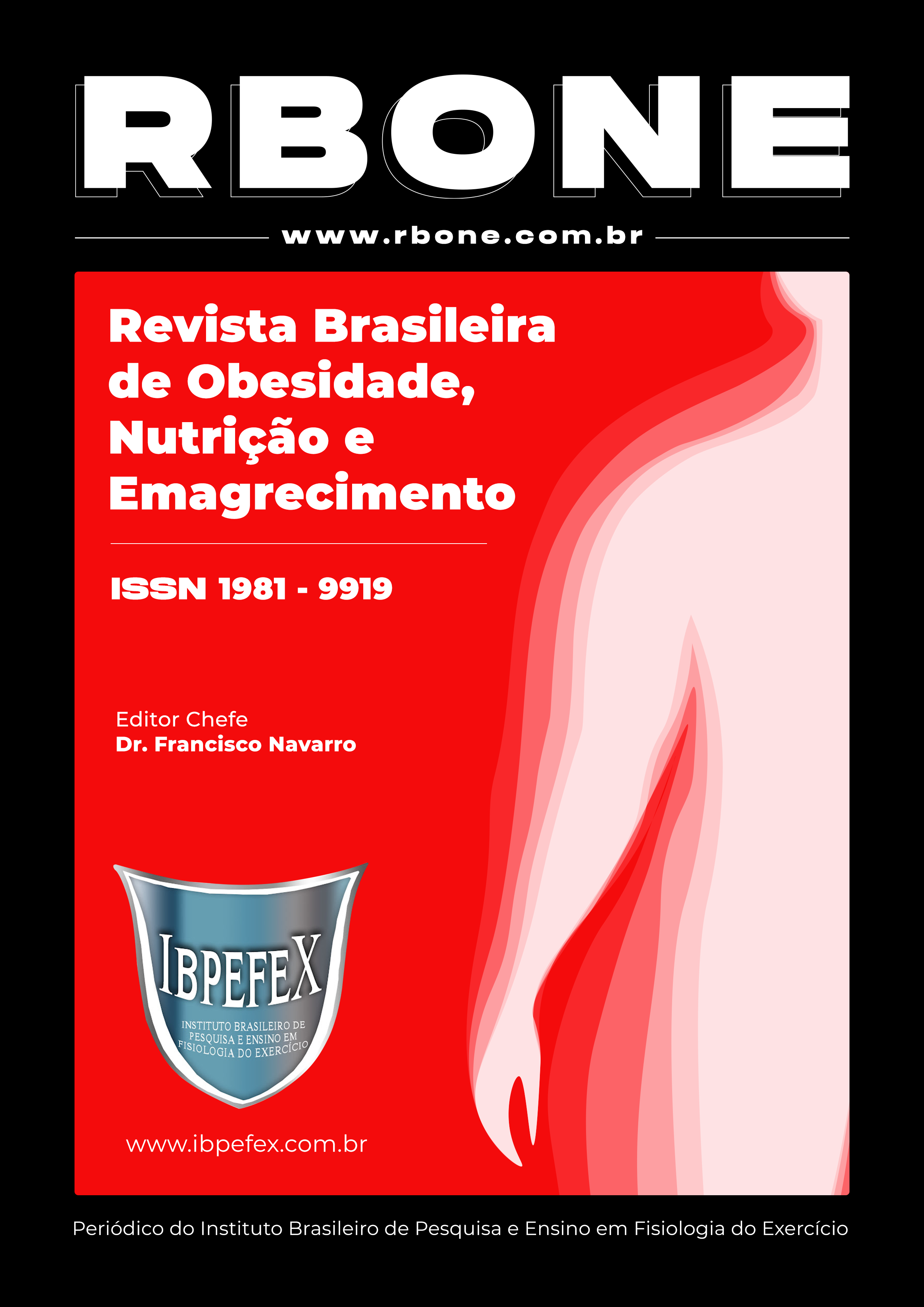Influence of stress on food consumption of academic’s students at a college in the interior of Minas Gerais
Abstract
Introduction: The entrance to a university is always surrounded by changes in the daily lives of students, characterizing a very important transitional moment. Academic requirements and more responsibilities cause stress, which may interfere with food consumption. Objective: Identify the changes and losses in food consumption in a stressful situation for students. Materials and Methods: It is considered a quantitative field research, where a food frequency questionnaire and stress scale (EPS-10) is applied in two moments: on the week of exams and two weeks after the exams. The statistical analysis was performed using the One-Way ANOVA program, using the t test for comparison between groups. Differences with p values <0.05 were considered. Result and discussion: there was an increase in the level of stress among students during the exam period, associated with the consumption of alcohol and foods rich in sugar and fat, as well as some reduction in the consumption of cereals, fruits, and vegetables, including mainly the students of the Chemical Engineering, Pharmacy and Nursing courses. Conclusion: It was possible to observe the importance of evaluating the emotional state and nutrition of university students, since stress may damage their dietary habits, consequently, their nutritional status and long-term health.
References
-Bettin, B.P.C. Fatores associados e instrumentos de avaliação da alimentação emocional: uma revisão narrativa da literatura. TCC. Universidade Federal do Rio Grande do Sul. Porto Alegre. 2017.
-Chaves, L.B.; Souza, T.F.; Silva, M.V.C.; Oliveira, C.F.; Lipp, M.E.N.; Pinto, M.L. Estresse em universitários: análise sanguínea e qualidade de vida. Revista Brasileira de Terapias Cognitivas. Vol. 12. Num.1. 2016. p. 20-26.
-Huh, J.; Shiyko, M.; Keller, S.; Dunton, G.; Schembre, S.M. The time-varying association between perceived stress and hunger within and between days. Appetite. Num. 89. 2015. p. 145-151.
-Leow, S.; Jackson, B.; Alderson, J.A.; Guelfi, K.J.; Dimmock, J.A. A role for exercise in attenuating unhealthy food consumption in response to stress. Nutrients. Vol. 10. Num. 2. 2018. p. 176.
-Luft, C.D.B.; Sanches, S.O.; Mazo, G.Z.; Andrade, A. Versão brasileira da Escala de Estresse Percebido: tradução e validação para idosos. Revista de Saúde Pública. Vol. 41. Num. 4. 2007. p. 606-615.
-Oliveira, H.F.R.; Risso, H.R.F.; Vieira, F.S.F.; Leal, K.A.S.; Novelli, C.; Noda, D.K.G.; Martins, G.C.; Casagrande, R.M.; Camargo, L.B.; Passos, R.P.; Junior, G.B.V. Stress and quality of life of University students. Revista CPAQV-Centro de Pesquisas Avançadas em Qualidade de Vida. Vol. 7. Num. 2. 2015. p. 2-7.
-Perez, P.M.P.; Castro, I.R.R.; Franco, A.S.; Bandoni, D.H.; Wolkoff, D.B. Práticas alimentares de estudantes cotistas e não cotistas de uma universidade pública brasileira. Ciência & Saúde Coletiva. Vol. 21. Num. 2. 2016. p. 531-542.
-Penaforte, F.R.; Matta, N.C.; Japur, C.C. Associação entre estresse e comportamento alimentar em estudantes universitários. Demetra: Alimentação, Nutrição & Saúde. Vol. 11 Num. 1. 2016. p. 225-237.
-Pino, D.L.D. Adaptação e validação de um questionário de Frequência alimentar para crianças de 6 a 10 anos. Dissertação de Mestrado. Universidade Federal do Rio Grande do Sul. Porto Alegre. 2009.
-Pomini, M.C.; Bordin, D.; Saliba, N.A.; Moimaz, S.A.S.; Fadel, C.B. A influência da posição acadêmica sobre condutas de saúde em universitários. Revista da ABENO. Vol. 18. Num. 1. 2018. p. 74-83.
-Philippi, S.T.; Latterza, A.R.; Cruz, A.T.R.; Ribeiro, L.C. Pirâmide alimentar adaptada: Guia para escolha dos alimentos. Revista Nutrition. Campinas. Vol. 12. Num. 1. 1999. p. 65-80.
-Richardson, A.S.; Arsenault, J.E.; Cates, S.C.; Muth, M.K. Perceived stress, unhealthy eating behaviors, and severe obesity in low-income women. Nutrition journal. Vol. 14. Num. 122. 2015. p. 1-10.
-Rombaldi, A.J.; Silva, M.C.; Neutzling, M.B.; Azevedo, M.R.; Hallal, P.C. Fatores associados ao consumo de dietas ricas em gordura em adultos de uma cidade no sul do Brasil. Ciência & Saúde Coletiva. Vol. 19. Num. 5. 2014. p. 1513-1521.
-Martins, C.C.F.; Tourinho, F.; Santos, V. Estresse: normal ou patológico?. Saúde & Transformação Social/Health & Social Change. Vol. 7. Num. 1. 2016. p. 1-8.
-Rosa, P.B.Z.; Giusti, L.; Ramos, M. Educação alimentar e nutricional com universitários residentes de moradia estudantil. Ciência & saúde. Vol. 9. Num. 1. 2016. p. 15-20.
-Santos, A.K.G.V.; Reis, C.C.; Chaud, D.M.A.; Morimoto, J.M. Qualidade de vida e alimentação de estudantes universitários que moram na região central de São Paulo sem a presença dos pais ou responsáveis. Rev. Simbio-Logias. Vol. 7. Num. 10. 2014. p. 76-95.
-Silva, I.M.G. Promoção de hábitos alimentares saudáveis no ambiente escolar: fortalecimento das ações de educação alimentar e nutricional e do programa de alimentação escolar. TCC. Universidade Federal de Pernambuco. Vitória de Santo Antão. 2018.
-Silva, D.C.A.; Frazão, I.S.; Osório, M.M.; Vasconcelos, M.G.L. Percepção de adolescentes sobre a prática de alimentação saudável. Ciência & Saúde Coletiva. Vol. 20. Num. 11. 2015. p. 3299-3308.
-Souza, D.C. Condições emocionais de estudantes universitários: estresse, depressão, ansiedade, solidão e suporte social. TCC. Universidade Federal do Triângulo Mineiro. Uberaba. 2017.
Copyright (c) 2022 Karina Thamires Antunes, Jéssica da Silva Alves Fernandes, Suzane Mota Marques Costa

This work is licensed under a Creative Commons Attribution-NonCommercial 4.0 International License.
Authors who publish in this journal agree to the following terms:
- Authors retain the copyright and grant the journal the right of first publication, with work simultaneously licensed under the Creative Commons Attribution License BY-NC which allows the sharing of the work with acknowledgment of the authorship of the work and initial publication in this journal.
- Authors are authorized to enter into additional contracts separately for non-exclusive distribution of the version of the work published in this journal (eg, publishing in institutional repository or book chapter), with acknowledgment of authorship and initial publication in this journal.
- Authors are allowed and encouraged to post and distribute their work online (eg, in institutional repositories or on their personal page) at any point before or during the editorial process, as this can bring about productive change as well as increase impact and impact. citation of published work (See The Effect of Free Access).






